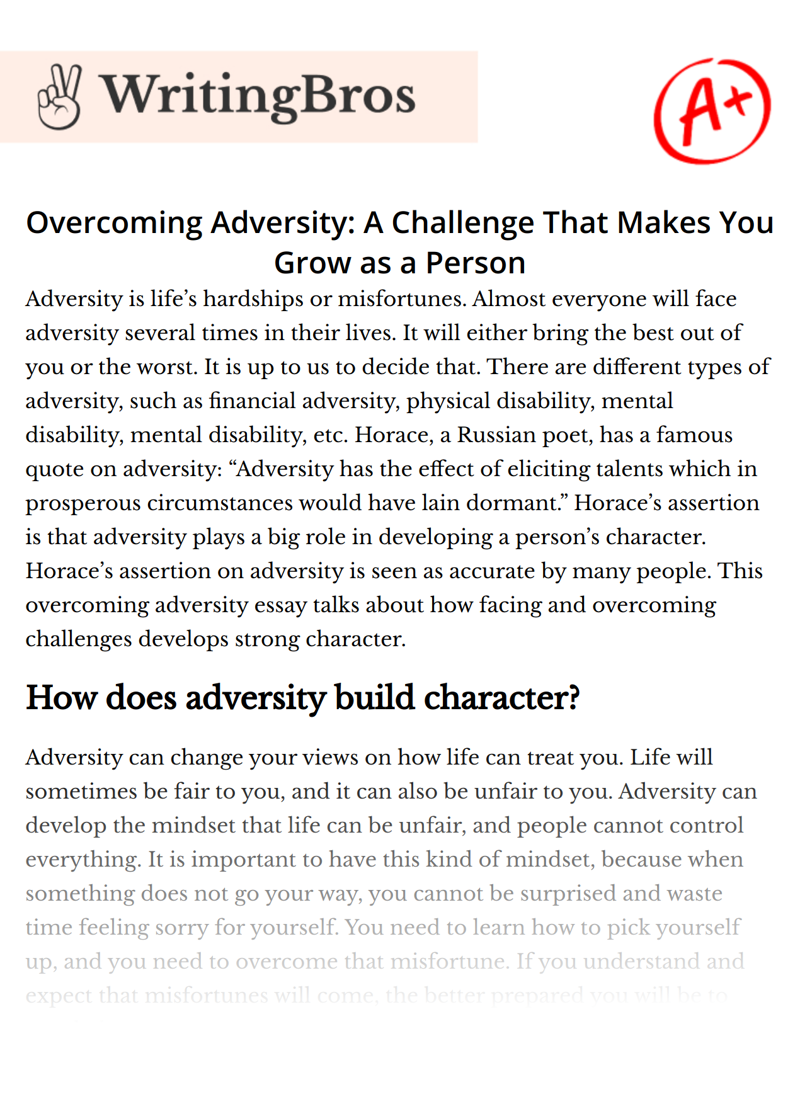Overcoming Adversity: A Challenge That Makes You Grow as a Person

Adversity is life’s hardships or misfortunes. Almost everyone will face adversity several times in their lives. It will either bring the best out of you or the worst. It is up to us to decide that. There are different types of adversity, such as financial adversity, physical disability, mental disability, mental disability, etc. Horace, a Russian poet, has a famous quote on adversity: “Adversity has the effect of eliciting talents which in prosperous circumstances would have lain dormant.” Horace’s assertion is that adversity plays a big role in developing a person’s character. Horace’s assertion on adversity is seen as accurate by many people. This overcoming adversity essay talks about how facing and overcoming challenges develops strong character.
How does adversity build character?
Adversity can change your views on how life can treat you. Life will sometimes be fair to you, and it can also be unfair to you. Adversity can develop the mindset that life can be unfair, and people cannot control everything. It is important to have this kind of mindset, because when something does not go your way, you cannot be surprised and waste time feeling sorry for yourself. You need to learn how to pick yourself up, and you need to overcome that misfortune. If you understand and expect that misfortunes will come, the better prepared you will be to attack that misfortune if/when it occurs, which could result in you overcoming that misfortune. Adversity changing your mindset on life in a positive way strongly develops character.
People grow by facing challenges. Every time you are able to overcome adversity, you grow by becoming more resilient. Roxane Cohen Silver, a psychologist at the University of California, Irvin, said, “Each negative event a person faces leads to an attempt to cope, which forces people to learn about their own capabilities, about their support networks — to learn who their real friends are. That kind of learning, we think, is extremely valuable for subsequent coping.” This is similar to lifting weights or exercising. Mental strength and physical strength are alike in that they both cannot develop without exercise/challenges. You cannot build muscle or lose weight without working out. Working out requires you to go out of your comfort zone, so that it can really make a difference. Facing challenges help people grow mentally, and facing challenges are a blessing in disguise.
It can be said that adversity doesn’t build character, but it reveals character. Adversity is just thrown at us, and we have to react to it. A single circumstance of adversity cannot build character. This, however, is not completely true. Even though adversity can reveal character, you grow by building strong character each time you face and overcome it. Though a single circumstance of adversity will not build much character, facing multiple circumstances of adversity will definitely build strong character, and facing adversity multiple times in life is a lot more likely than facing adversity just once.
Horace is “right on the money” with his assertion that facing and overcoming adversity helps build strong character. Facing adversity teaches you a lesson that life will not always be fair, and you need to rise above the misfortunes. Facing adversity means facing a challenge, and that is how you grow mentally and even physically. Building strong character is so important, because people with strong character set high goals for themselves, and they don’t give up until they achieve them. People can rise above adversity and opposition. All of these qualities can lead anybody to success in life.
References
- Bonanno, G. A. (2004). Loss, trauma, and human resilience: Have we underestimated the human capacity to thrive after extremely aversive events? American Psychologist, 59(1), 20-28. https://doi.org/10.1037/0003-066x.59.1.20
- Frankl, V. E. (2006). Man's search for meaning. Beacon Press.
- Masten, A. S. (2011). Resilience in children threatened by extreme adversity: Frameworks for research, practice, and translational synergy. Development and Psychopathology, 23(2), 493-506. https://doi.org/10.1017/S0954579411000198
- Masten, A. S., & Barnes, A. J. (2018). Resilience in children: Developmental perspectives. Children, 5(7), 98. https://doi.org/10.3390/children5070098
- Park, C. L., & Fenster, J. R. (2014). Stress, coping, and health: The significance of spirituality. In The Oxford handbook of stress, health, and coping (pp. 245-261). Oxford University Press.
Cite this Essay
To export a reference to this article please select a referencing style below

